Ciência_Iscte
Publicações
Descrição Detalhada da Publicação
Título Revista
Sustainability
Ano (publicação definitiva)
2019
Língua
Inglês
País
Suíça
Mais Informação
Web of Science®
Scopus
Google Scholar
Esta publicação não está indexada no Overton
Abstract/Resumo
The sharing economy is an emerging niche for innovation capable of disrupting established socio-technical and economic regimes. Because of this potential to cause radical changes in a wide array of domains, research in multiple disciplines addressing various aspects entailing this phenomenon is proliferating. In this emerging body of literature, the understanding and framing of the sharing economy are often different. Without knowledge about the current state of the research related to the sharing economy, delineating research trends, gaps, and needs for directing effectively primary research are not possible. This study aimed to synthesize the state and distribution of existing publications related to the sharing economy in multiple disciplines. We used the systematic mapping technique to scope, identify, and classify the publications at a fine level of granularity. We reviewed 589 journal articles (published from 1978 to 2017), and 454 met the selection criteria. The journal articles reviewed were published in 284 different journals. Intriguingly, 15 journals published five to 13 publications each and 221 journals had a single article about the topic. Journals belonging to the subject areas “business, management and accounting” (42.1%) and “social sciences” (35.2%) published more than 70% of the reviewed publications. Accommodation (19.8%) and car and ridesharing (17.2%) were the two most prominent sectors; 50.2% of the publications addressed C2C transactions (10.6% B2C, 24.4% more than one type); 62.3% were about accessing resources, and 5.1% concerned transfer of ownership (i.e., second-hand or donation); and 19.2% covered access and transfer of ownership simultaneously. While empirical studies were the majority (53.1%, when comparing with conceptual ones), qualitative approaches were most common (51.5% against 24.9% quantitative and 17.4% mixed methods). Literature review (22.9%), survey (13.2%), case study (7.3%) and interview (7%) were the most frequently used methods. User behavior (26.4%), business models and organizational aspects (22.7%), institution and governance system (18.7%), conceptualization matters (17%), and sustainability evaluation (15.3%) are research clusters identified from a grounded approach. The link between user behavior and net environmental impacts of sharing options was the largest gap found in the research needing attention from a sustainability perspective. Accordingly, multidisciplinary investigations quantifying behavioral root causes, magnitude, and likelihood of environmental rebound effects using real-world data are strongly encouraged.
Agradecimentos/Acknowledgements
--
Palavras-chave
Sharing economy,Collaborative consumption,Collaborative economy,Systematic map,Sustainability
Classificação Fields of Science and Technology
- Economia e Gestão - Ciências Sociais
Registos de financiamentos
| Referência de financiamento | Entidade Financiadora |
|---|---|
| 771872 | Comissão Europeia |
| UID/GES/00315/2019 | Fundação para a Ciência e a Tecnologia |
| 2018-01545 | Swedish Research Council Formas |
Contribuições para os Objetivos do Desenvolvimento Sustentável das Nações Unidas
Com o objetivo de aumentar a investigação direcionada para o cumprimento dos Objetivos do Desenvolvimento Sustentável para 2030 das Nações Unidas, é disponibilizada no Ciência_Iscte a possibilidade de associação, quando aplicável, dos artigos científicos aos Objetivos do Desenvolvimento Sustentável. Estes são os Objetivos do Desenvolvimento Sustentável identificados pelo(s) autor(es) para esta publicação. Para uma informação detalhada dos Objetivos do Desenvolvimento Sustentável, clique aqui.

 English
English




